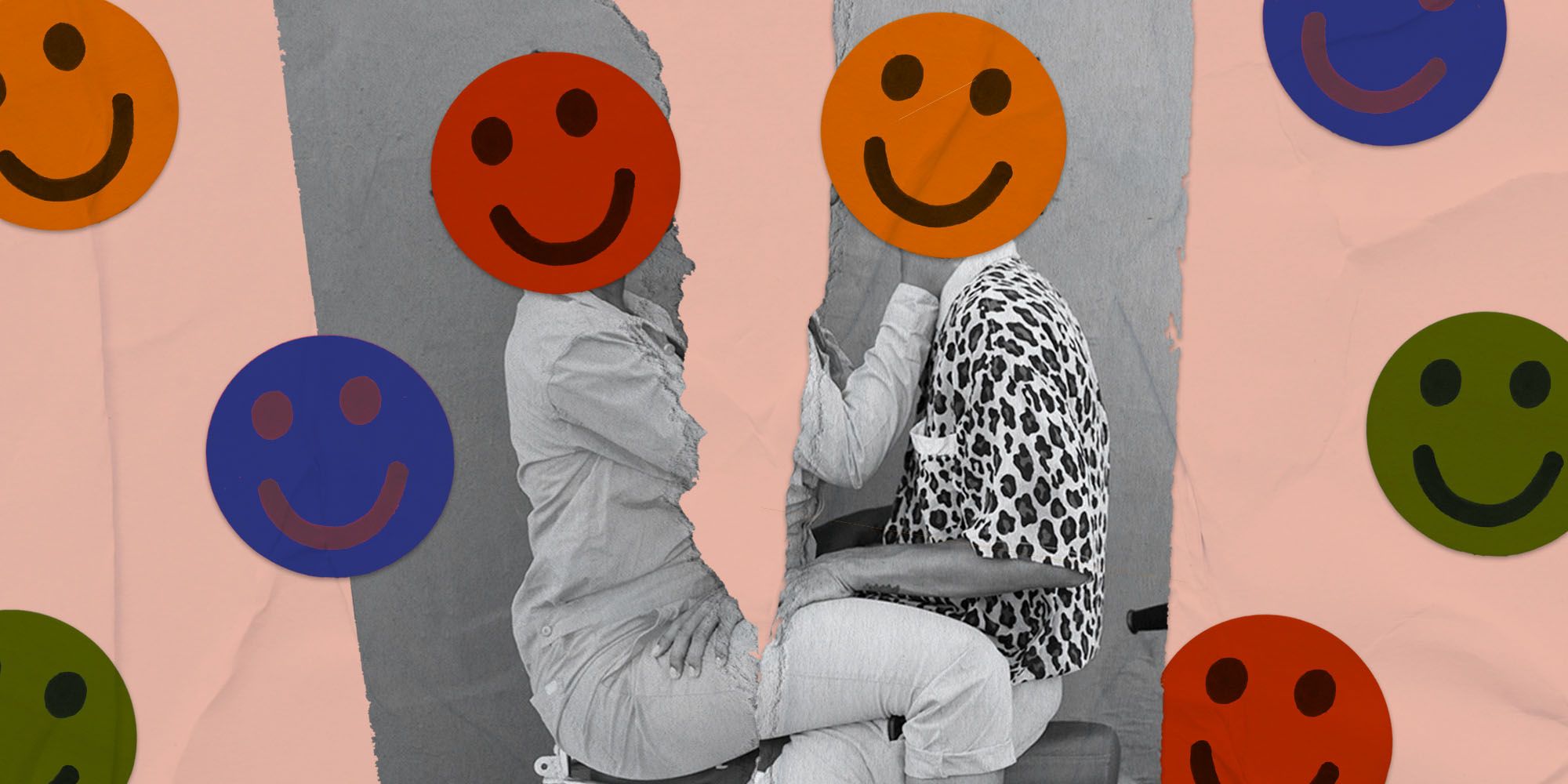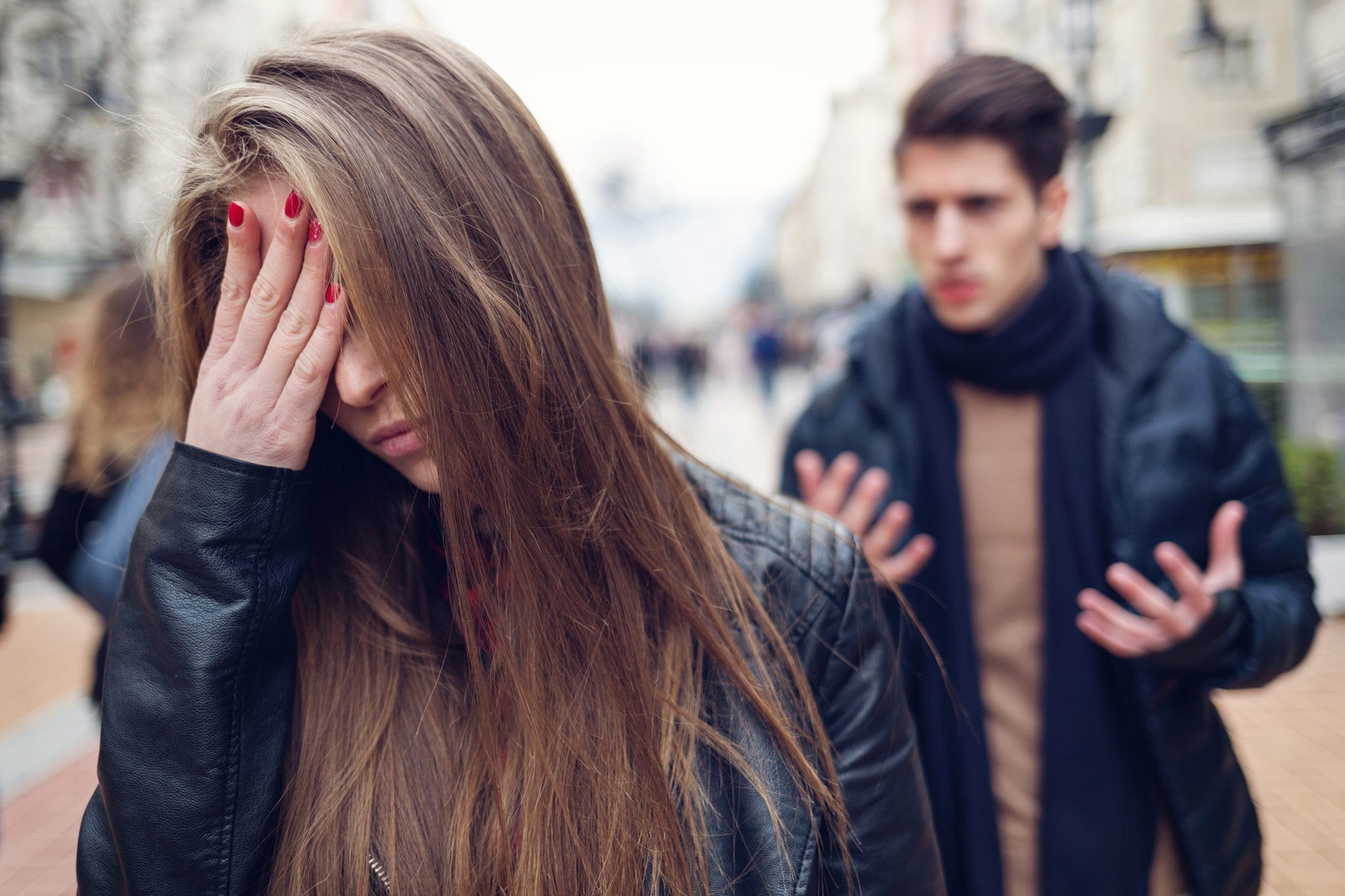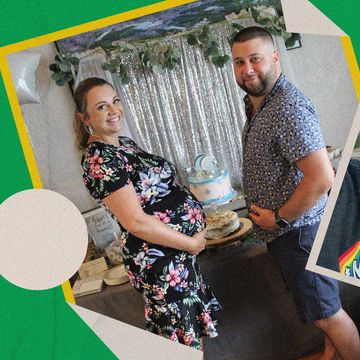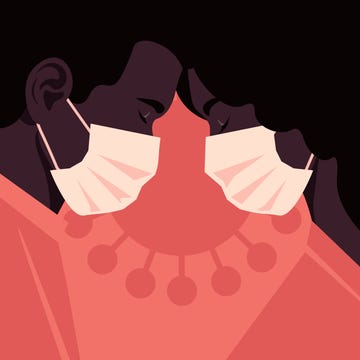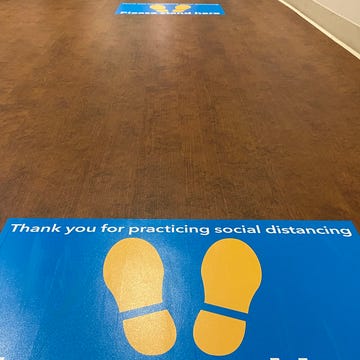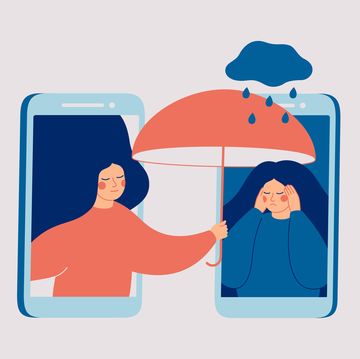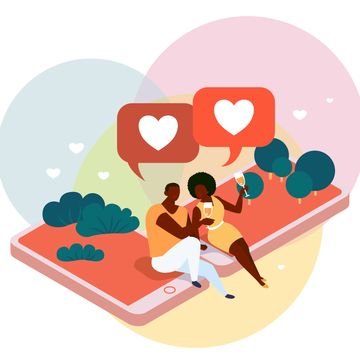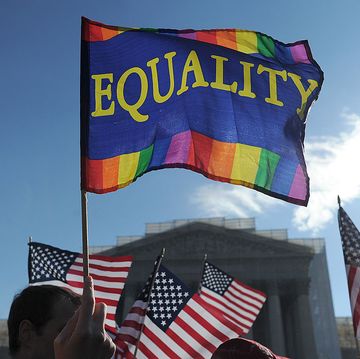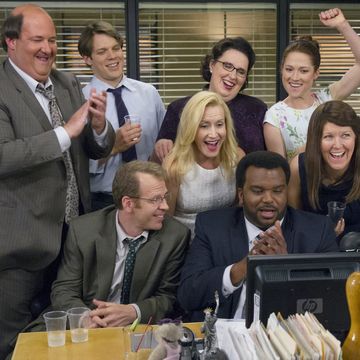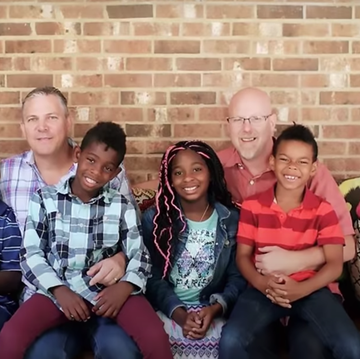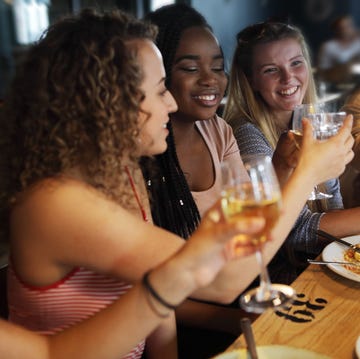Many years ago, my partner made me believe I was defective for struggling to see the bright side of things. In an attempt to save our relationship, I found myself taking on an excessively optimistic perspective, which I’ve since discovered is known as “toxic positivity.” At the time, I had no idea how much danger it would put me in.
When we first met, I learned that both of us had been raised in strict, patriarchal communities. We’d both rebelled against the norm and subsequently found our own unique versions of spirituality in our 20s. I was an atheist into mindfulness meditation and Buddhist philosophy, which I’d discovered in college while battling treatment-resistant depression and severe anxiety. The central tenet of Buddhism — life is suffering — rang true to me. I also liked the idea that we were all interconnected in this suffering. This spoke to the urge I had to commit my life to fighting for social justice.
My new boyfriend, on the other hand, was a firm believer in a pseudoscience of sorts known as the law of attraction. We’d only been dating a few weeks or so when he first introduced me to it. One evening, he switched from playing my selection of music on my laptop — an old Modest Mouse album — to a strange lecture coming from a creepy woman’s voice. He told me he knew this sounded weird, but Esther Hicks was considered a “channeler” for “Abraham,” a group of non-physical entities that spoke through her about how to manifest health, wealth, and happiness.
I felt my heart pounding and wanted to disappear. I’d grown up pretending to be Catholic in the buckle of the Bible Belt in order to ward off Southern Baptists and evangelists who wanted to “save” people like me. So many people — including some of my own family members — had insisted for years that someday I’d “come back” to the church (as if I’d ever wanted to be there). Now the guy I was falling in love with was revealing to me that he believed in what sounded like a cult — and he just assumed I wanted to hear about it.
I firmly told him that I wasn’t interested in this. I said I respected other people’s beliefs — including his — but I didn’t like having them sprung on me like that. He apologized and said he understood. After a while, I gently switched us back to Modest Mouse and the subject fell away.
Our first few dates had been so amazing. We’d exchanged our life histories and dreams, stayed up until dawn talking. I’d already told my mom and my best friend I thought he could be the one. But the closer we got, the more our worldviews clashed.
As I researched it more, I learned that the law of attraction wasn’t just some fringe belief. Oprah had popularized it by spotlighting the self-help book The Secret on her show. And a slew of celebrities seemed to endorse it or at least used the lingo. As my boyfriend explained it to me, you get what you think, so think positively and flourish, or think negatively and get the dreary existence you manifested for yourself. To me, this sounded like an oversimplified version of existentialism: Create your own destiny! But I didn’t like that it seemed to ignore the many outside factors that could block you from succeeding no matter your thoughts: poverty, illness, oppression, inequity.
The cynical side of me saw “manifesting” as an excuse for people to believe they deserved the good things that happened to them. It sounded like one of the many iterations of the same old rugged individuality, prosperity gospel, and meritocracy so many Americans were into.
Having grown up in a place where I didn’t accept the dominant religion, I understood the dark side of belief systems. After studying philosophy and religion in college, though, I also loved the fertile ground they provided for storytelling, meaning-making, community building, and explorations of intense questions and quandaries.
As I fell in love with this person and we began to plan our lives around each other, I felt the need to come to terms with his beliefs — even if I’d never share them. But I couldn’t help but worry he’d been taken by what could be a hurtful or at the very least misleading philosophy. He thought I needed to change my thinking.
When I got into a graduate program in creative writing, he decided to move to a new city with me. We were struggling to get along, but I loved him. And part of me genuinely admired his positivity and seeking soul — he truly believed each of us had endless possibilities ahead of us. We just had to attract them with the right energy.
As my mom had always told me, I’d find God when I was desperate enough, when I really needed Him, when I was down on my knees. That happened after our move. A few weeks in, our fights over what I wore to work, my partner’s paranoia and jealousy over other men (colleagues, would-be friends, even strangers on the street), and just about anything collided into my worries about what the neighbors could hear — I’d even rush to the car when he started yelling to try to contain his screaming inside. Still, I had a relentless need to figure out how to help him.
Soon, however, my partner began to turn his worldview against me. When I found out he’d cheated on me, he didn’t take responsibility for his actions. Instead, he pointed out that I’d chosen to take a trip with my father and abandoned him. It was my fault he’d strayed. I’d made it happen. When I complained about struggling to pay the bills or affording groceries on my small stipend from my scholarship, he insinuated that I could buy whatever I wanted, even a new car, if I just got more credit cards. I was supposed to have faith that someday I could pay off my debt, that the universe would show up for me with thousands of dollars and a book deal, and it was my lack of belief in myself that was holding me back.
The problem with toxic positivity and the law of attraction is that when you fail, you may be primed to believe that other variables don’t matter and that your pain doesn’t either — so you should push it down or ignore it. You could be convinced that you deserve your own suffering and mistreatment because you didn’t think or believe positively enough.
That’s very similar to how an abusive relationship works. Because of my partner’s constant put-downs, pressure, and blame, I came to believe that our relationship problems were because I “triggered” him.
During long baths, I daydreamed about possibilities, my own vision for the future: a dog, marriage, kids. I was so committed to this fantasy, a shared future I wanted so badly, that I believed I could usher us into the life I wanted by sheer optimism and force of will. All the while, my partner’s abusive language escalated into physical violence.
I told myself I could manage and hide the very worst of him if that meant I could keep the good — long Saturday mornings in his arms, romantic dinners out on the town, beach walks at sunset. I was so convinced I could “fix” him, I started recording his “episodes” and used a mantra to get through hours of fighting. “I love you; I don’t want to fight,” I chanted through tears. I really believed that all it took to survive, to make him change, to help him get better … was me. I just had to do, feel, think, and say the right things.
In the midst of trying to navigate all this, life got even harder when I crashed and totaled my car. As we walked away from the crumpled mess and it started raining, I semi-jokingly shouted at the sky as I imagined Job would, asking God what else He wanted to throw at me. “You are what you eat,” my partner said to me in a low voice. The meaning: If you ask for more suffering, you deserve what you get.
I was so angry at him for suggesting that I deserved this, something as terrible and random as a car crash or whatever might come after. I felt so down, like I needed a serious change to get through this and reconnect with my partner. So, I decided to do something I never thought I’d do: I adopted a mindset of radical acceptance and optimism. I knew that this wasn’t “me,” but I was desperate to feel better, and maybe my attitude wasn’t helping. Maybe I really did need to adjust my perspective. As we walked back up to our apartment, I noted how sunlight had begun to peek out from the clouds, how the raindrops sparkled.
I began to keep a gratitude journal and tried to practice positivity moment to moment. But “trying on” outwardly good-for-me practices couldn’t solve the biggest problem I was dealing with. And in the weeks that followed, my partner’s “bad side” only got worse. One evening, while he was gone at work, I called the National Domestic Violence Hotline to try to get him help but hung up because I still didn’t see myself as a “victim.”
I’d done my best to keep our issues private for months, but they exploded into public view at my first reading during one of the largest events of the year for my graduate program. Shortly after I’d read, I thought we were in the clear. But then my partner got up onstage and began screaming. He cursed out the entire room — all of my colleagues, my employer, the few acquaintances I had — with a stream of f-yous in a hateful, embarrassing, and unprovoked rant.
I’d never been so humiliated in my life. As bar staff escorted him out, an acquaintance whisked me away and insisted I sleep on her couch. That night, I finally broke down and told her everything he’d done to me: the name-calling, demands and intimidation, other things I’d never told anyone and still don’t like to share. When I tried to explain how complicated our situation was, when I told her how I was at fault too, she was firm. “No one deserves to be treated that way,” she told me.
I broke down sobbing and let her hold me. I let myself ignore his texts and calls. And by morning, I still felt absolutely awful and dreaded going back to school on Monday. I got a pixie cut, thinking if people were going to look at me, I might as well give them something to look at. I started wearing heavy mascara and black eyeliner because it made me feel better. Oddly enough, it felt good to allow myself to feel bad. I needed to be sad, to accept just how terrible things had gotten.
Despite how much my partner had hurt and betrayed me, I was still in love with him and wanted to believe we could get through this with counseling or a batterer’s prevention program. I considered ending things off and on, but we shared an apartment, and I couldn’t afford rent on my own. I didn’t know where I would go or how I would manage on my own. In my mind, it was easier to snap back into our normal routine than to give up on us and let everyone in my life know our relationship had failed.
A month or so later, during our scariest fight, I locked my partner out of our bedroom to get away from him. As he pounded on the door, demanding to be let in, I considered calling 911. But there were no marks, I didn’t know what he could be arrested for, if anything, and I worried the police wouldn’t believe me anyway. In the morning, I called his parents and told them to come get him. We were breaking the lease.
I was heartbroken and didn’t want to leave him, but my acquaintance-turned-friend convinced me that we needed a break at the very least. She helped me move into a spare bedroom in her home. With time, I eventually began to see my ex for who he really was: a sad shell of a person, someone whom I couldn’t help and didn’t need or want to be around anymore. I stopped going back to him.
Recently, research came out that confirmed something I’d suspected about my experience but never had the words for. I didn’t understand that my partner’s worldview — the one I’d tried to adopt — was a form of toxic positivity.
As it turns out, an excessively optimistic perspective can be especially harmful and counterproductive for people in abusive relationships. According to a 2020 review of 29 studies on domestic violence published in the International Journal of Wellbeing, a “positive bias” can set you up to underestimate the severity of abuse and stay in an abusive relationship, subjecting yourself to escalating violence, just like I did.
Sometimes, even the darlings of positive psychology — optimism, hope, and forgiveness — can be bad for you, the study says. A firm commitment to them, one that trumps reality, can stifle your ability to see and accept the growing danger inside your own home.
As a victim and survivor, I consider myself someone who is still recovering from what I went through. I’ll never tell you that surviving this person made me a better person or that there was a silver lining or gift somewhere in what really was akin to interpersonal psychological torture.
But what I can say is that I found an alternative to toxic positivity that works for me, which was recently described by Scott Barry Kaufman in a piece in The Atlantic. It’s called “tragic optimism.” The term was coined in 1949 by Viktor Frankl, a Holocaust survivor, existential-humanist psychologist, and the author of Man’s Search for Meaning. It means positivity in the face of tragedy. It’s not a demand to feel better or force yourself into a lighter perspective when times are bad. Rather, it’s a worldview that offers space to grow from suffering, to transform guilt into an opportunity for change, to see your own looming mortality as a reason to make the most of your time to try and make the world a better place.
Now, living through a pandemic, climate change, and massive suffering with rates of domestic violence on the rise, there’s never been a better time to give it a shot. In my experience, it’s much easier and more productive than toxic positivity. A few quick pointers: Don’t assume that what makes you feel better is what someone else needs. Make space for people you love to sit in hurt, especially when they’ve been seriously hurt. Consider removing trite, unhelpful, and stigmatizing phrases like “good vibes only” and “think positive” from your vocabulary. And don’t be afraid to simply empathize and listen. Phrases like the following come more naturally, and they’re more helpful, especially when you’re trying to support abuse victims and survivors: Yeah, that sucks. I hurt for you. No one deserves to be treated that way. I’m here for you. Tell me what you need. How can I best support you?
When I hit bottom, more than anything, I just needed someone to see that I was in pain, that things were very not okay, and to take that seriously. That alone — straightforward realism and empathy — helped give me the strength to believe in my own reality and see that I needed to distance myself from my abuser.
Although this might read as less triumphant or inspiring than some other stories during Domestic Violence Awareness Month, I’m really happy to be free from the pressure to “manifest” anything. I’m not going to miraculously skyrocket to success in my career or get rich with some pipe dream. I know that’s not how the world works, and it’s going to take building better, more compassionate communities to get any of us anywhere. I’m still in debt, and my current relationship takes a lot of hard work as we navigate post-traumatic stress and the misunderstandings and hang-ups that come with it.
It’s been a handful of years since I left. To be frank, healing has taken way longer than I thought it would. But I can say I’ve finally found a form of optimism that makes sense for me. And for that, I’m grateful.
Lauren Krouse is a freelance journalist and creative nonfiction writer based in the southeastern United States. Her work has appeared inWomen’s Health, Men’s Health, AARP, Prevention, Self, HuffPost, Shenandoah, and elsewhere. Follow her on Twitter @laurkrouse.
Get Shondaland directly in your inbox: SUBSCRIBE TODAY
